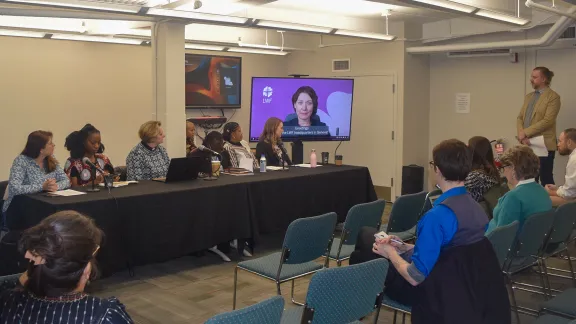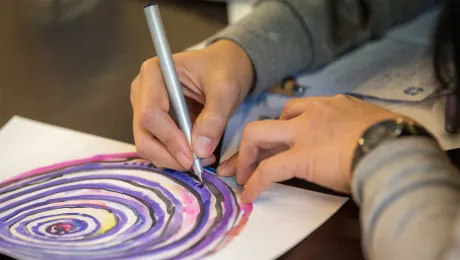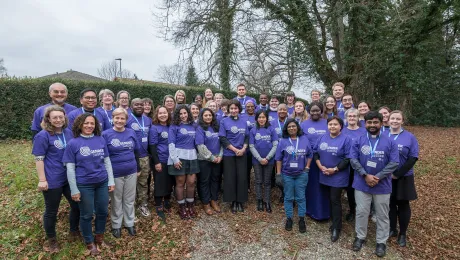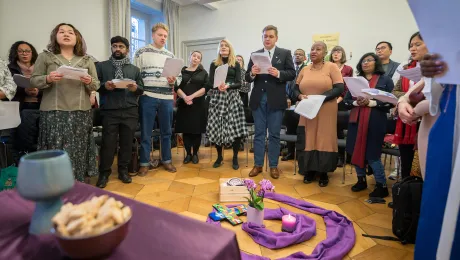On the opening day of the 68th Commission on the Status of Women, LWF delegates showcased successful work to support women's financial empowerment

On opening day of CSW68, LWF panelists take part in a discussion on ways in which they are working to financially empower women. Photo: St Peter’s Church NY/J. Lewis
LWF delegates share projects that financially empower women and challenge discriminatory practices
(LWI) - From the reintegration of former combatants in Colombia’s civil war, to the provision of small grants for women wanting to start a business in Madagascar. From financial and legal support for women who have lost their land in Zimbabwe to emergency food and hygiene packages for survivors of natural disasters in Chile.
Delegates of The Lutheran World Federation (LWF) to the UN’s Commission on the Status of Women (CSW) showcased the many ways in which they are working to address poverty, in particular supporting women and girls who are disproportionately affected and too often denied their right to a life with dignity.
The 68th session of the CSW opened in New York on 11 March and will focus for the next two weeks on the theme of ‘addressing poverty, strengthening institutions and financing with a gender perspective’. LWF delegates from over a dozen different countries are bringing their experiences of working to empower women in grassroots communities, by challenging discriminatory practices and offering skills training or employment opportunities to enable them to become financially independent.
Livelihoods and conflict transformation
Laura Chacón Gonzales, Communications and Advocacy Coordinator for LWF Colombia shared insights into the work of a four-year project which has helped to reintegrate into society women who had been part of the guerilla movement in Colombia’s long running civil war. This included training in agricultural production, as well as partnerships with the private sector and cooperatives to enable the women to sell their produce at competitive prices.
“More than 2,000 families, including indigenous and Afro-Colombian women, have benefitted from this project,” she said. “Just as important,” she continued, “is the strengthening of mechanisms and workshops on conflict transformation,” enabling women to share the many ways in which they have been affected by the conflict. These include health complications they have suffered because of toxic chemicals used to destroy coca crops, including miscarriages and the malformation of fetuses.
Bringing the faces of women
Elsewhere in Latin America, Rev. Sandra Rozenberga-Saavedra, in charge of women’s ministry in the Evangelical Lutheran Church in Chile (IELCH), emphasized the importance of “bringing the faces of the women” she serves to the governments and civil society organizations who will be negotiating the CSW68 'agreed conclusions’ document. “These are mostly older women, many suffering from some physical or mental disability, some in the rural areas unable to read or write,” she said.
Originally from Latvia, she helped to establish the Association of Lutheran Women Theologians in her home country before moving to Venezuela and then to Chile in 2001. She talked about the work the IELCH has done to provide healthcare and education for women, including two schools and two kindergartens so that mothers can go out to work to become financially independent. Other projects include emergency food and hygiene packages for survivors of natural disasters such as earthquakes, fires and flooding which are increasingly common in Chile.
The government should put strict measures [....] to ensure that women have equal rights to own and control their land, regardless of their marital status.
Rev. Dr Elitha Moyo, Evangelical Lutheran Church in Zimbabwe
Two delegates from Africa, Rev. Dr Elitha Moyo from Zimbabwe and Holiharifetra Rakotondramiadana from Madagascar, spoke about the many challenges that women and girls face, especially in the rural areas. Moyo, who serves as ELCA regional representative for gender justice in southern Africa, said most women “do not own land in their name and have limited control over it, therefore it can be taken away from them at any time.” The government, she said, “should put strict measures on community leaders responsible for land distribution to ensure that women have equal rights to own and control their land, regardless of their marital status.”
Rakotondramiadana talked about the lack of education and employment opportunities for women, including in the church where female theology graduates are often unable to find positions in parishes. “If a married woman wants to continue her studies, her husband may threaten to leave and find another wife,” she said. As gender justice coordinator for the Malagasy Lutheran Church, she shared stories of providing small grants for women to train and earn an income in baking, hairdressing or farming. “Many women are able to transform their lives, like one who received a piglet to start a pig farm and over the past three years has been able to build her own house,” she said.
In the Middle East, Canadian Lutheran World Relief (CLWR) has partnered with LWF Jerusalem to design and support a project known as GRIT, or gender responsive and inclusive technical and vocational education and training in the West Bank. CLWR’s gender focal point, Kristy Bergman Schroeder explained that the project was set up to address the challenges of unemployment among Palestinian women, including those with disabilities. Over the past six years, the project has challenged the many cultural barriers that women face through community awareness raising, as well as improving the quality of vocational training and rolling out a gender learning platform in nine West Bank institutes.
The Evangelical Lutheran Church in America (ELCA) is another key LWF partner in the work of empowering women to overcome poverty and discrimination. Rahel Mwitula Williams, ELCA’s director of Innovation and Ideas, highlighted a process called ‘design thinking’, in which solutions must be found by those with needs, rather than being imposed from the outside. “This type of innovation will look different in different countries and contexts,” she said, “but the important thing is to listen as we seek to find solutions together.”


